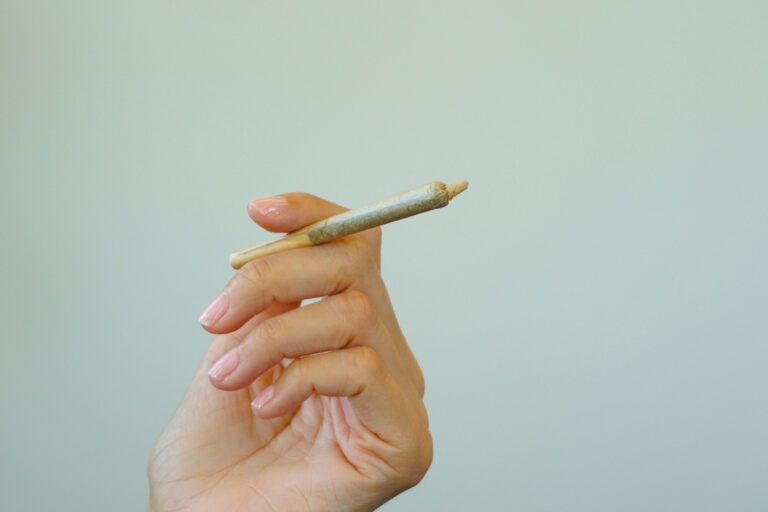Making weed a Class A drug is a bad idea, despite what Tory commissioners say
Earlier this October 2022, a group of Conservative police commissioners called for weed to be reclassified from a Class B drug to a Class A—which would put it up there with some of society’s most harmful substances: cocaine, methadone, and heroin.
Despite the chance of this happening being—spoiler alert—pretty slim, the claims have pricked the ears of Home Secretary Suella Braverman, who said she was on the “same side” as the commissioners. The Sunday Times further reported that a close source to Braverman said she was strongly opposed to calls to decriminalise cannabis, which she believed would send a “cultural” and “political” signal that using the drug was “acceptable behaviour.”Under the proposal, anyone caught with a bag of weed could be slapped with a maximum of five to seven years in prison, with dealing landing you 14 years to a life sentence—a just punishment for a “gateway drug” in Braverman’s eyes.
The world is waking up to cannabis reform while the UK lags behind
Sounds overkill? That’s because it is. Just this week, Joe Biden announced a presidential pardon for all marijuana offences, a monumental step forward for recreational and medicinal users in the country. Other countries, like Germany and Thailand, are also starting to reform their laws.
The rest of the world seems to be recognising the benefits of a legal or decriminalised cannabis market, while Britain is burying its head in the sand, or even worse, going the opposite direction. It’s important to note that Liz Truss has stated that the government has no intentions to change the laws on cannabis at present: but the news has, once again, brought to the forefront how damaging hardline Tory ideals can be.
“In my opinion, it’s all just political rhetoric. It’s a way to please social conservative constituents and party members—to tow the party line that the party is tough on drugs,” Katya Kowalski from the drug policy think tank, Volteface, told SCREENSHOT. “They’re using this to stick to their conservative roots.”
“It’s come at a very convenient time to distract the public from everything else that’s gone on,” Kowalski continued. The Conservative party has suffered following Truss’ catastrophic ‘mini-budget’—some could argue this statement is a desperate attempt to claw back votes. Regardless, it’s clear the public is in favour of keeping weed as a Class B, with a recent poll by YouGov suggesting that 77 per cent of the British public want laws to remain the way they are.
Why making cannabis a Class A is a bad idea
There are endless reasons why enforcing stricter cannabis laws would be a bad idea. First and foremost, making weed a Class A would have a detrimental impact on medicinal cannabis patients. Although medicinal cannabis has been legal in the UK since November 2018, private prescription is unaffordable for many—forcing people into the black market to source their medicine. “Although nothing would change for people on prescription, it means that those having to source their medicine from the black market would be subject to much higher criminal penalties,” Kowalski added.
“It would also increase the stigma towards medicinal cannabis patients. Cannabis use is already stigmatised, but not nearly as much as cocaine and heroin,” Kowalski continued. “If you put cannabis into the same classification [as cocaine and heroin], the average person that doesn’t understand much about drug policy will automatically assume it’s just as harmful—and, consequently, users will be just as stigmatised.”
“We have a medical cannabis community of around 17,000 on the books in the UK,” May Woods, editor of the cannabis publication Green Queen Magazine, told SCREENSHOT. “If we start criminalising cannabis as a Class A the stigma these people experience will get worse: from police treatment to landlords, employers and members of the public.”
Stricter laws would also have an impact on our police force. “It’s just impractical,” Woods added, noting how the Crown Court is already plagued with a backlog of cases. Just this week, the backlog of criminal cases in court reached a record high—making cannabis a Class A would only make this backlog worse.
“It’s also important to consider county line gangs, who exploit young people to bring cannabis across the country,” Woods noted. “They’re the ones who are going to be punished if caught and put in prison—it’s families who are going to be pulled apart.”
Enforcing stricter laws would change police behaviour and culture too. “There would be a massive rise in arrest, as well as stop-and-searches,” Kowalski noted. “It would give the police more of an excuse to go after marginalised, vulnerable communities—it’s something they already do now.”
Ultimately, the rhetoric around this issue aims to make cannabis less of “a criminal issue and less of a public health issue, we don’t need more of that,” Kowalski concluded. The UK has made, albeit slow, progress in relaxing cannabis laws over the last decade. However, as highlighted by certain members of the Conservative party over recent weeks, we still have a long road ahead of us in realising this plant’s economic and health potential. If cannabis reform was a marathon, America and Germany would be close to the finish line. Britain, on the other hand, would be trailing behind and gasping for air.






